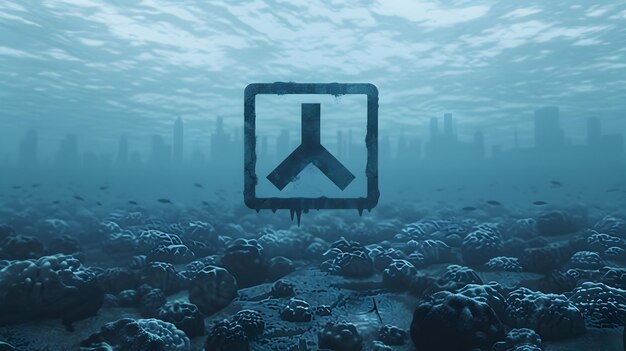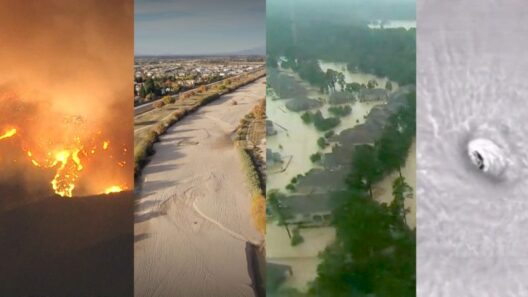Coral reefs, often epitomized as the “rainforests of the sea,” thrive in the sun-kissed shallows of tropical oceans, teeming with an unprecedented wealth of biodiversity. However, beneath this picturesque veneer lies a grave reality — these vibrant underwater cities are facing calamity due to the insidious advance of global warming. The intimate relationship between climate change and oceanic ecosystems forms a poignant narrative of struggle, adaptation, and inevitable metamorphosis.
The plight of coral reefs can be likened to a symphony’s final movement: harmonious notes fading into a cacophony of dissonance as climate change disrupts their rhythmic pursuits. Just as musicians rely on precise tuning to create beauty, corals depend upon a delicate balance of environmental conditions to thrive. As temperatures rise, the very foundation of this marine symphony, coral polyps, find themselves under siege. Elevated sea temperatures wreak havoc on their symbiotic partners, zooxanthellae, which confer crucial nutrients through photosynthesis. The subsequent phenomenon known as bleaching starkly illustrates this disastrous interplay. Under stress, corals expel these vital algae, transforming from vibrant mosaics into bleached skeletons — a grim visual of nature’s despair.
As the ocean warms, it also absorbs carbon dioxide more readily, introducing another element of peril: ocean acidification. This troubling transformation alters the chemical composition of seawater, undermining the ability of corals to calcify. The very structures that offer shelter to myriad species erode, akin to ancient cathedrals crumbling under the weight of time. The structural integrity of reefs diminishes, with repercussions reverberating throughout the marine ecosystem. Fish and invertebrates that depend on these habitats are left vulnerable, their homes — once bustling with life — now becoming ghostly remnants of a thriving past.
Yet, the story of coral reefs does not solely hinge upon the ravages of temperature and acidity. The intersection of pollution, overfishing, and habitat destruction exacerbates their plight. Nutrient runoff from agricultural fields converges into the seas, catalyzing harmful algal blooms that suffocate corals. Overexploitation of marine species further complicates this narrative; the removal of keystone species disrupts ecological equilibrium, reminiscent of pulling a thread from a tightly woven tapestry, leading to unraveling and decay.
The unique appeal of coral reefs extends beyond their breathtaking beauty. They serve as critical reservoirs of biodiversity, housing approximately 25% of all marine life despite covering a mere fraction of the ocean floor. This intricate web of life represents the product of millions of years of evolutionary brilliance. The loss of a single coral species can cascade through the ecosystem, affecting everything from tiny plankton to large predatory fish, culminating in a broader decline in ocean health. The consequences of global warming thus resonate far beyond coral, implicating our very existence on this planet.
In contemplating this calamity, one must ask: what are the broader implications for humanity? Coral reefs are not merely geological formations; they are invaluable resources that provide sustenance, coastal protection, and economic opportunities through ecotourism and fisheries. Nations esteemed for their coral reefs, such as the Maldives and the Great Barrier Reef, confront existential threats in the wake of climate change. The economic toll of reef degradation translates into loss of livelihood, food security, and cultural heritage for millions. Hence, the urgency to act resonates not just in scientific communities but among individuals whose lives are woven into the fabric of the ocean.
Recognizing the dire state of our reefs mandates proactive engagement. Conservation initiatives should prioritize the reduction of carbon footprints, promotion of sustainable fishing practices, and restoration projects. For example, the practice of coral gardening — cultivating and transplanting coral fragments to degraded areas — holds promise, combined with measures to mitigate pollution and enhance marine protected areas. It epitomizes a future where humanity honors the reciprocal relationship with the natural world, striving not for dominion but for stewardship.
Education and outreach serve as powerful tools in galvanizing community action. By fostering awareness of coral reef ecosystems’ fragility, individuals can become champions for change within their spheres of influence. Coastal communities, especially, have a vested interest in advocating for policies that mitigate climate change and promote resilience. Engaging younger generations through educational programs ensures the perpetuation of this crucial environmental dialogue, encouraging a legacy rooted in ecological responsibility.
As the curtain falls on this narrative of reefs in peril, it is crucial to understand the interconnectedness of all life on Earth. Coral reefs are not just vibrant underwater gardens but pivotal players in the global climate system. They are the canaries in the coal mine for broader ocean health, reflecting our planet’s state of well-being. The fate of reefs will ultimately mirror our commitment to addressing climate change with urgency and resolve.
In summation, the plight of coral reefs serves as a clarion call, urging us to reshape our interactions with the ocean. As we strive for a harmonious existence on this planet, let us remember that the health of our oceans reflects the health of our civilization. Act we must, for the stakes are higher than we can imagine; to lose coral reefs is not merely to lose beauty, but to endanger the very foundations of life itself.








